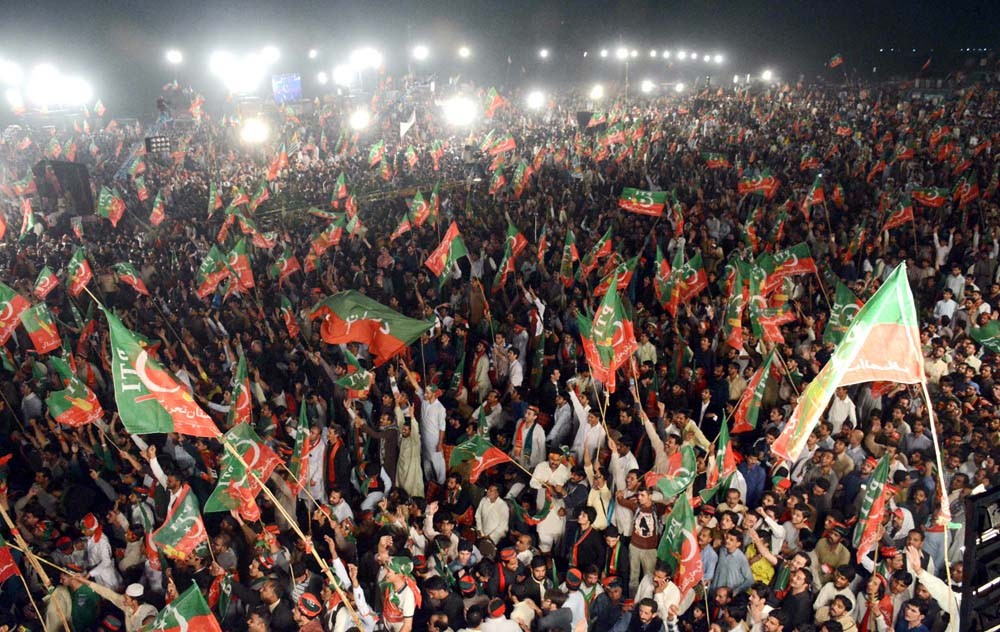
The lockdown may have given way to thanksgiving over the formation of a judicial commission but the challenges for the government and democracy are still not over

It was the last few days of October. Parts of Rawalpindi and Islamabad looked like a battlefield with workers of the Pakistan Tehreek-e-Insaf (PTI) pitched against the security forces of the federal and Punjab governments where the Pakistan Muslim League-Nawaz (PML-N) rules.
The PML-N launched a crackdown on the PTI workers amid the propagated fear that the military establishment was behind the protest. The backdrop was a controversial news report, indicating heightened civil-military tension. A few days before November 2, the government asked the information minister Pervaiz Rashid to resign to facilitate an independent inquiry into the matter.
Before long, the PTI’s promised lockdown on November 2 had turned into a public rally -- euphemistically called a Thanksgiving Day -- following the intervention by the Supreme Court on, seemingly, both parties’ behalf.
With the cause of immediate tension removed, the government still does not look comfortable, and its situation is no less than the proverbial "out of the frying pan into the fire" at the moment.
"Imran Khan’s statements like declaring PM Sharif a ‘security risk’ or referring the matter to ‘third umpire’ led to the impression that the PTI was creating a civil-military imbalance. Even if Imran Khan gives such statements to exploit the situation politically, these remarks are damaging for democracy and have repercussions too," says senior journalist Arif Nizami.
He views that though "the political dust is settled somehow, the civil-military divide can widen over the issue of the leaked story and subsequent removal of federal information minister".
The PTI lockdown was against the government’s obvious reluctance to probe into the Panama Papers scandal that included the names PM Nawaz Sharif’s children. It came at a time when the name of the new army chief was yet to be announced by the government. The Difa-e-Pakistan -- an alliance of religious factions including JuD and other sectarian outfits -- rally only added to the uncertainty and unrest.
The PTI also started playing politics on this ongoing civil-military divide that further strengthened the ruling set-up’s doubts. That is why many PML-N ministers publicly alleged that the PTI was bringing activists of banned outfits’ in its protest.
Later, Interior Minister Ch Nisar himself sat with a delegation of the Difa-e-Pakistan Council (DPC). After this meeting, the blocked National Identity Cards and passports of some clerics of this alliance were restored. They were further allowed to hold a rally in Islamabad as a successful attempt to politically manage these groups.
Meanwhile, the Supreme Court of Pakistan, which had first rejected the petitions of opposition parties against Nawaz Sharif for his children’s name in Panama Papers, re-accepted them and fixed the case for November 1, a day before the lockdown date given by the PTI.
A five-member bench of the Supreme Court (SC) hearing the Panamagate petitions on Thursday, Nov 3, decided that a single-member commission will be formed to probe the revelations made in the Panama Papers after reviewing all replies.
Some analysts question the taking up of the Panama issue by the Supreme Court on Nov 1, implying that there was a push by certain elements. Others assume that the court was only wanting to restore peace and normalcy in the country as the political conflict was heading towards total chaos. The fact remains that Imran Khan had taken the matter to the highest pitch possible and his sudden acceptance of the Supreme Court’s suggestion about the formation of a judicial commission is being seen as quite a comedown. Rumours have it that the cooling of political temperature has everything to do with a pressure from the Chinese who see the current anarchic situation as a big hindrance to the smooth functioning of China Pakistan Economic Corridor (CPEC).
Lawyer and political analyst Saroop Ijaz says "the ongoing crisis could have motivated or compelled courts to take notice as the highest forum, so that if the situation worsens the people can’t blame the judiciary for not hearing this matter of grave concern about the alleged corruption of ruling elite". He says there have been examples in the past when the court started addressing such matters, especially after 2009.
"They [the SC] might have found some of the interventions necessary or they thought they shouldn’t become marginal actors or they wanted to leave some legacy behind," he says.
For some analysts, the people’s mobilisation by the PTI must have played a role in provoking the Supreme Court into action. "The Panama Papers issue was a factor that united the opposition and, hopefully, it would be dealt with a sense of urgency which seems clear from court proceedings. I think the whole street demonstration, however limited it was, contributed to the attention of court for taking up the issue with a sense of urgency," says television anchor and commentator Nasim Zehra.
Ijaz thinks the courts assume the highest position as mutual arbitrators in sorting out matters. "That is why the Supreme Court would have felt compelled to rethink about the petitions earlier rejected by the Registrar as frivolous."
Chaudhry Nisar Ali Khan recently said that the ‘planted’ news report had caused a "serious civil-military divide" and "affected the country’s national security narrative." Some days ago before this news, PML-N MNA Rana Afzal in a standing committee meeting, loudly criticised his country for protecting Hafiz Muhammad Saeed, Chief of Jamaat-ud-Dawah (JuD), one of the groups allegedly involved in cross border terrorism and other such factions, asking the country’s military establishment as to "which eggs Hafiz Saeed lays for them."
According to Arif Nizami, in the coming days, "leaving the Panama Commission aside, this [civil-military] divide could be the main focus. The challenges for democracy and sitting regime are not over yet."